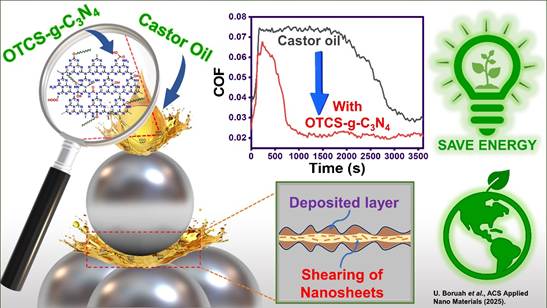Researchers develop eco-friendly lubricant with superior performance
Researchers develop eco-friendly lubricant with superior performance
Scientists have developed an environmentally friendly lubricant formulation that significantly enhances friction reduction, wear resistance, and overall performance. This advancement offers a sustainable alternative to conventional lubricants, addressing both efficiency and environmental concerns.
Lubrication reduces friction and wear in machinery, ensuring efficiency and longevity. Conventional mineral or synthetic oil-based lubricants pose environmental risks, driving the demand for sustainable alternatives.
In order to address this issue, researchers at the Institute of Advanced Study in Science and Technology (IASST), Guwahati, an autonomous institute of Department of Science and Technology, formulated a lubricant formulation by integrating surface-modified graphitic carbon nitride (g-C3N4) into bio-based castor oil.

Fig: Schematic illustration of Surface-Modified Graphitic Carbon Nitride as a High-Performance Additive in Bio-Based Oils
The group led by Prof. Devasish Chowdhury, along with Ujjibit Boruah, Inspire JRF, Bitupan Mohan, UGC-JRF and Dr. Nabajit Dev Choudhury from ASTU enhanced the compatibility of the lubricant with the oil by chemically modifying the g-C3N4 nanosheets using octadecyltrichlorosilane (OTCS), resulting in improved dispersibility and stability.
Study of friction, lubrication, and wear of interacting surfaces in relative motion (tribological evaluations) demonstrated remarkable improvements—reduction of friction by around 54 %, and decrease of wear volume by 60.02% compared to castor oil alone. The lubricant also exhibited a higher load-bearing capacity and greater thermal stability, with the oxidation onset temperature rising from 320°C to 339°C demonstrating the efficiency of developed lubricating formulation. Furthermore, toxicity assessments confirm minimal formation of free radicals (more generation of free radical will lead to further secondary reactions) making the formulation safe for environmentally sensitive applications.
“This sustainable lubricant formulation not only enhances mechanical performance but also aligns with global efforts toward green and efficient lubrication technologies,” said Prof. Chowdhury. The findings were recently published in ACS Applied Nano Materials.